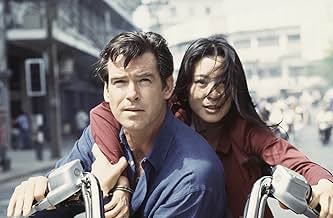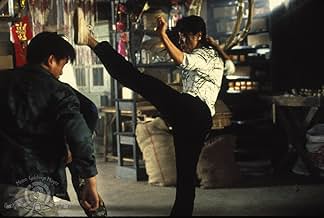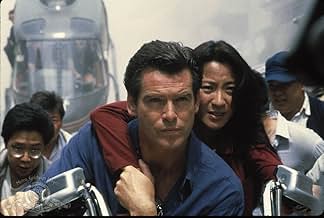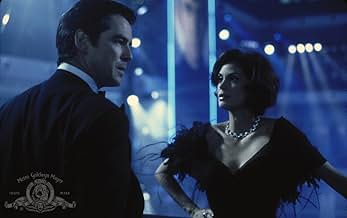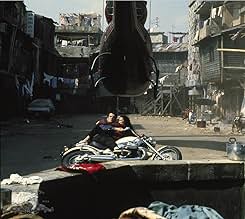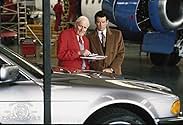जेम्स बॉन्ड विशेष वैश्विक मीडिया कवरेज प्राप्त करने के लिए चीन और ब्रिटेन के बीच युद्ध को प्रेरित करने की एक मीडिया मुगल की योजना को रोकने के लिए तैयार है।जेम्स बॉन्ड विशेष वैश्विक मीडिया कवरेज प्राप्त करने के लिए चीन और ब्रिटेन के बीच युद्ध को प्रेरित करने की एक मीडिया मुगल की योजना को रोकने के लिए तैयार है।जेम्स बॉन्ड विशेष वैश्विक मीडिया कवरेज प्राप्त करने के लिए चीन और ब्रिटेन के बीच युद्ध को प्रेरित करने की एक मीडिया मुगल की योजना को रोकने के लिए तैयार है।
- निर्देशक
- लेखक
- स्टार
- पुरस्कार
- 6 जीत और कुल 10 नामांकन
फ़ीचर्ड समीक्षाएं
You don't review James Bond movies, you evaluate them, rate them according to how well they meet expectations. There are certain things one has come to expect, even demand of a Bond film and each individual effort either delivers or it doesn't. So, here are ten elements that make a Bond film a Bond film and how TOMORROW NEVER DIES rates on a scale of 1 to 10:
Title: TOMORROW NEVER DIES: Poetic pretension aside, the "Tomorrow" in this case is the name of a newspaper. And the film's original title was "Tomorrow Never Lies," a more mundane slogan, but not nearly suitable for a Bond film. 8 points.
Pre-Credit Teaser: Bond interrupts the sale of various illegal weapons and casually stops a nuclear disaster in the bargain. Another elaborate teaser with Bond escaping the bad guys at the last minute, leaving a bunch of explosions in his wake. Nicely done, I suppose, but old hat. 5 points.
Opening Credits: After Daniel Kleinman's debut work on the credits for GOLDENEYE, his graphics here are particularly disappointing. There is almost a generic quality to Kleinman's choice of images, reflecting the worst of Maurice Binder's prototypes. Worse, the disturbing shots of the female body made up of circuits and micro chips is rather creepy re- enforcing the clichéd concept of Bond Girls as mere objects. 2 points.
Theme Song: It may not be the all-time worst Bond theme song, but Sheryl Crowe's "Tomorrow Never Dies," cowritten with Richard Froom, just might be the most sleep-inducing. Perhaps she is trying to imitate the great Shirley Bassey, but Crowe's drowsy rendition is listless and just downright dreary. A second theme song ends the film; k. d. lang's "Surrender" is somewhat better than Crowe's contribution -- but not by much. It's strange, but by this time the producers of the series are picking and choosing from multiple submissions from various noted artists, yet they still end up selecting themes songs that are, at best, mediocre. 2 points.
"Bond, James Bond": As Bond, Pierce Brosnan seems to be trying awfully hard to not crack so much as a smile, thus when he does seem to be enjoying himself it's cause for applause. After the sardonic style he restored to the character in GOLDENEYE, it is disheartening to see him returning to the glum approach that Timothy Dalton took. 4 points.
Bond Babes: Somewhere between being Lois Lane and becoming a Desperate Housewife, Teri Hatcher added "Bond Girl" to her resume. Alas, she brought none of her proved gift for playing spunky heroines with a comic touch to the role; as the villain's depressed ill-fated wife, she may be the most morose Bond Girl of all time. But she is balanced out in glorious style by Michelle Yeoh as Wai Lin, a Chinese agent who teams up with 007, both on his mission and on some of the best staged stunts of the series. While sex and sexiness have all but faded from the Bond films, Yeoh personifies the evolution of the Bond Girl to that of a strong and dynamic professional. 10 points.
Bond Villain: Of all the villains James has faced, Elliott Carver just might be the most insipid. Though played by the very talented Jonathan Pryce, the character is a power-mad media mogul who hopes to start World War III, so he can have exclusive rights to cover it with his print and broadcast outlets. That is a lot of effort for such a meager pay back. Though prone to occasional temper tantrums, the owlish Carver is about as threatening as a junior high school principal who is upset about graffiti on the boys room wall. 1 point.
Bond Baddies: Vincent Schiavelli is one of those actors born to play a bad guy. With his sad, droopy Salvadore Dali face, he instantly gave character to any role just by his presence. Here, as assassin Dr. Kaufman, he is rather subdued, but he gives a nice comic twist to the character's dour professionalism. He is assisted by his protégé, Stamper, who unfortunately is played far less memorably by Götz Otto. Stamper is yet another cold, emotionless Ayran killer in the Donald Grant mold and, while he is a formidable opponent in battle, he is a dull character otherwise. 7 points.
Sinister Plot: There are just so many holes in Carver's dastardly plan that even the most far-fetched Bond action stunt is more believable. The idea that a publisher has to create news in order to have something to print is as old as yellow journalism, but there just isn't a whit of common sense in Carver's reckless drive to create a world war that would endanger, not expand his own media empire. Plus, what idiot would place in print stories about his own crimes, even before he committed them. He is just a stupid, stupid man and it is a stupid, stupid plot. 0 points.
Production values: The film's saving grace is the remarkable stunt work featuring Bond and Wai Lin handcuffed together and escaping via motorcycle from the villain's helicopter, through the slums of Saigon. Obviously influenced by the over-the-top stunts work of Asian cinema, it provides quite a kick to an otherwise lackluster film. 8 points.
Bonus Points: I don't know if it is social commentary or just motion picture showmanship, but once again we are treated to the mindless destruction of a poor Third World community. Though expertly done, the chase that runs amok in a crowded, impoverished Saigon neighborhood, terrorizing the poor and destroying their meager homes, all without a second thought, paints a vivid portrait of Super Power arrogance. We'll pretend it is meant as social commentary and add 5 points.
Summary: What this film does best, it does very well. But it's negatives far outweigh its positives. TOMORROW doesn't die; it's already DOA.
Bond-o-meter Rating: 52 points out of 100.
Title: TOMORROW NEVER DIES: Poetic pretension aside, the "Tomorrow" in this case is the name of a newspaper. And the film's original title was "Tomorrow Never Lies," a more mundane slogan, but not nearly suitable for a Bond film. 8 points.
Pre-Credit Teaser: Bond interrupts the sale of various illegal weapons and casually stops a nuclear disaster in the bargain. Another elaborate teaser with Bond escaping the bad guys at the last minute, leaving a bunch of explosions in his wake. Nicely done, I suppose, but old hat. 5 points.
Opening Credits: After Daniel Kleinman's debut work on the credits for GOLDENEYE, his graphics here are particularly disappointing. There is almost a generic quality to Kleinman's choice of images, reflecting the worst of Maurice Binder's prototypes. Worse, the disturbing shots of the female body made up of circuits and micro chips is rather creepy re- enforcing the clichéd concept of Bond Girls as mere objects. 2 points.
Theme Song: It may not be the all-time worst Bond theme song, but Sheryl Crowe's "Tomorrow Never Dies," cowritten with Richard Froom, just might be the most sleep-inducing. Perhaps she is trying to imitate the great Shirley Bassey, but Crowe's drowsy rendition is listless and just downright dreary. A second theme song ends the film; k. d. lang's "Surrender" is somewhat better than Crowe's contribution -- but not by much. It's strange, but by this time the producers of the series are picking and choosing from multiple submissions from various noted artists, yet they still end up selecting themes songs that are, at best, mediocre. 2 points.
"Bond, James Bond": As Bond, Pierce Brosnan seems to be trying awfully hard to not crack so much as a smile, thus when he does seem to be enjoying himself it's cause for applause. After the sardonic style he restored to the character in GOLDENEYE, it is disheartening to see him returning to the glum approach that Timothy Dalton took. 4 points.
Bond Babes: Somewhere between being Lois Lane and becoming a Desperate Housewife, Teri Hatcher added "Bond Girl" to her resume. Alas, she brought none of her proved gift for playing spunky heroines with a comic touch to the role; as the villain's depressed ill-fated wife, she may be the most morose Bond Girl of all time. But she is balanced out in glorious style by Michelle Yeoh as Wai Lin, a Chinese agent who teams up with 007, both on his mission and on some of the best staged stunts of the series. While sex and sexiness have all but faded from the Bond films, Yeoh personifies the evolution of the Bond Girl to that of a strong and dynamic professional. 10 points.
Bond Villain: Of all the villains James has faced, Elliott Carver just might be the most insipid. Though played by the very talented Jonathan Pryce, the character is a power-mad media mogul who hopes to start World War III, so he can have exclusive rights to cover it with his print and broadcast outlets. That is a lot of effort for such a meager pay back. Though prone to occasional temper tantrums, the owlish Carver is about as threatening as a junior high school principal who is upset about graffiti on the boys room wall. 1 point.
Bond Baddies: Vincent Schiavelli is one of those actors born to play a bad guy. With his sad, droopy Salvadore Dali face, he instantly gave character to any role just by his presence. Here, as assassin Dr. Kaufman, he is rather subdued, but he gives a nice comic twist to the character's dour professionalism. He is assisted by his protégé, Stamper, who unfortunately is played far less memorably by Götz Otto. Stamper is yet another cold, emotionless Ayran killer in the Donald Grant mold and, while he is a formidable opponent in battle, he is a dull character otherwise. 7 points.
Sinister Plot: There are just so many holes in Carver's dastardly plan that even the most far-fetched Bond action stunt is more believable. The idea that a publisher has to create news in order to have something to print is as old as yellow journalism, but there just isn't a whit of common sense in Carver's reckless drive to create a world war that would endanger, not expand his own media empire. Plus, what idiot would place in print stories about his own crimes, even before he committed them. He is just a stupid, stupid man and it is a stupid, stupid plot. 0 points.
Production values: The film's saving grace is the remarkable stunt work featuring Bond and Wai Lin handcuffed together and escaping via motorcycle from the villain's helicopter, through the slums of Saigon. Obviously influenced by the over-the-top stunts work of Asian cinema, it provides quite a kick to an otherwise lackluster film. 8 points.
Bonus Points: I don't know if it is social commentary or just motion picture showmanship, but once again we are treated to the mindless destruction of a poor Third World community. Though expertly done, the chase that runs amok in a crowded, impoverished Saigon neighborhood, terrorizing the poor and destroying their meager homes, all without a second thought, paints a vivid portrait of Super Power arrogance. We'll pretend it is meant as social commentary and add 5 points.
Summary: What this film does best, it does very well. But it's negatives far outweigh its positives. TOMORROW doesn't die; it's already DOA.
Bond-o-meter Rating: 52 points out of 100.
James Bond (Pierce Brosnan) heads to stop a media mogul's plan to induce war between China and the UK in order to obtain exclusive global media coverage.
The Bond films are both hit and miss as well as an acquired taste. And each time there is a new Bond, people readjust and some people just will not move on. Personally, I think Brosnan was a great Bond, and I actually think this is one of the best films in the series, contrary to popular opinion.
Much of the series is either about Soviet issues or post-Soviet issues. This one, however, is about global media dominance. Now 20 years old, it seems more appropriate than ever with its satellites and cell phones. This movie could have been made today with only the most minor of adjustments.
The Bond films are both hit and miss as well as an acquired taste. And each time there is a new Bond, people readjust and some people just will not move on. Personally, I think Brosnan was a great Bond, and I actually think this is one of the best films in the series, contrary to popular opinion.
Much of the series is either about Soviet issues or post-Soviet issues. This one, however, is about global media dominance. Now 20 years old, it seems more appropriate than ever with its satellites and cell phones. This movie could have been made today with only the most minor of adjustments.
This film isn't quite as good as "Goldeneye", but it still another fun addition to the series.
Pierce Brosnan once again shines as James Bond, and Wai Lin, played by Michelle Yeoh, is quite possibly the toughest Bond girl ever. She does a lot of karate and steals the show as much as Brosnan.
Elliot Carver, played by Jonathan Pryce, is a pretty decent villain. He is nowhere near as intimidating as some of the best Bond villains, but he is certainly passable. His goals were a little more realistic than most Bond villains. His henchmen is just another Red Grant clone.
The story, while not the deepest, has a lot of intriguing elements with Carver writing disasters in his newspaper and making them happen. The media angles makes a lot of sense these days. The locations work, especially Thailand.
This film is up there with "Moonraker" as one of the most relentlessly action-packed entries in the series. We get a spectacular opening sequence, a chase in a parking garage with Bond using his remote-control BMW, a wicked motorcycle chase, and so much more.
This is a very solid if slightly by-the-numbers entry in the series. There is rarely a dull moment, and there is enough action for several movies. Another fun Bond film.
RATING: B
Pierce Brosnan once again shines as James Bond, and Wai Lin, played by Michelle Yeoh, is quite possibly the toughest Bond girl ever. She does a lot of karate and steals the show as much as Brosnan.
Elliot Carver, played by Jonathan Pryce, is a pretty decent villain. He is nowhere near as intimidating as some of the best Bond villains, but he is certainly passable. His goals were a little more realistic than most Bond villains. His henchmen is just another Red Grant clone.
The story, while not the deepest, has a lot of intriguing elements with Carver writing disasters in his newspaper and making them happen. The media angles makes a lot of sense these days. The locations work, especially Thailand.
This film is up there with "Moonraker" as one of the most relentlessly action-packed entries in the series. We get a spectacular opening sequence, a chase in a parking garage with Bond using his remote-control BMW, a wicked motorcycle chase, and so much more.
This is a very solid if slightly by-the-numbers entry in the series. There is rarely a dull moment, and there is enough action for several movies. Another fun Bond film.
RATING: B
One of the standard received ideas of film criticism is to say that sequels are almost never as good as the original film. (There are also a few standard exceptions to this rule, such as 'The Godfather Part 2' and the second and third parts of the 'Lord of the Rings' trilogy). Subject to these exceptions, however, there seems to be a law of diminishing returns to the effect that the more sequels a franchise spawns, the worse they become. The Bond films, however, seem to me to provide the most striking exception to this principle. The franchise started with 'Dr No' in the early sixties, and 'Tomorrow Never Dies' amounts to 'James Bond XVIII', or 'James Bond XIX' if one includes 'Never Say Never Again' in the total. Despite this, one can watch the latest offerings with as much pleasure as the original Sean Connery films from the sixties and seventies.
The Bond films are highly formulaic. They typically start with an action sequence before the opening credits that has little or nothing to do with the film that is to follow. The main story will involve Bond thwarting a dastardly plot by some megalomaniac bent on world domination. It will always involve at least one extended chase sequence, and possibly two or more. The main character, apart from Bond and the villain, will always be a beautiful young woman who helps Bond in his quest and who will end up by falling for him. There will always be at least one other beautiful girl, either as a secondary heroine or as a villainess. The villain will always have a small army of henchmen ready to do battle on his behalf. The story will always end with a shoot-out, normally in the villain's headquarters, in which Bond manages to avert the threatened disaster at the last minute.
'Tomorrow Never Dies' contains all these formulaic elements. It is, nevertheless, in my view one of the better entries in the Bond canon, for a number of reasons beyond the fact that Pierce Brosnan is the best Bond since Connery. These can be summarised as follows:-
1. The Villain. Jonathan Pryce plays Elliott Carver, a newspaper and media tycoon intent on whipping up a war between Britain and China. The reason is to facilitate the accession to power of his ally, a renegade Chinese general who has promised to give his organisation exclusive broadcasting rights in China. Bond villains have always provided scope for some splendidly over-the-top displays of acting, going back to Lotte Lenya's Rosa Klebb and Gert Frobe's Goldfinger. Although Pryce's Carver is more restrained than some, it falls within this tradition. At first sight the silver-haired bespectacled Carver seems mild-mannered and soft spoken, but soon reveals the raving megalomania which is the hallmark of the Bond villain. Particularly noteworthy is the speech where Carver states his ambitions as being 'power' and 'world domination'. Although he puts a liberal, metaphorical interpretation on these two concepts, the audience is left in no doubt that he means what he says quite literally. There is also a good performance from Gotz Otto as Carver's brutal German henchman, Stamper.
2. The Girl. Admittedly, Teri Hatcher is rather wasted as the secondary Bond girl Paris Carver, Elliott's wife and a former girlfriend of Bond. Michelle Yeoh, however, is superb as the main female lead, the Chinese secret agent Wai Lin. (That's how it's spelled, although the pronunciation used in the film suggests that the name should actually be transliterated as Wei Lin). Apart from Michelle's striking looks, she is also an accomplished martial arts performer, and her skills are put to good use in this film. (Part of a trend of giving Bond girls a more active role, in contrast to the earlier films in the series where they were required to do little other than look decorative.) 3. The Chase Sequence. The main one, in which Bond and Wai Lin escape on a motorbike through the streets of Hanoi from the villains in a helicopter, is excellent. 4. The Opening Sequence. As usual, this has little to do with the main plot line. It does, however, fit in with a growing tendency in the Bond films, that of mocking or undermining the militaristic, macho values which the series was once accused of promoting. This film introduces a new comic character, the gung-ho, blustering Admiral Roebuck, a sort of naval equivalent of Colonel Blimp, who clashes with the more liberal 'M', the female chief of the British Secret Service. (I was interested to learn that the actors who play them, Geoffrey Palmer and Judi Dench, are husband and wife in real life). In the opening sequence, Bond narrowly prevents Roebuck's blundering attempt to bomb a gathering of international terrorists from setting off a nuclear explosion. The more active roles for female characters are also part of the trend towards a politically correct Bond, as is, perhaps, his remark that smoking is a 'filthy habit'. (The earlier films were often criticised for glamorising the habit by making Bond himself a smoker).
As with all the Bond films, one can probably pull holes in the plot of 'Tomorrow Never Dies'. (The scene where Carver sinks a British warship by cutting a hole in the side with what looks like a giant chainsaw struck me as particularly implausible. What's wrong with a torpedo?) Nevertheless, the Bond films are not meant to be works of social realism and unlike, say, the novels of John Le Carre, have never purported to give an accurate picture of life in the British Secret Service. 'Tomorrow Never Dies' is a good example of what the Bond films have always been- superior escapist entertainment. 7/10
The Bond films are highly formulaic. They typically start with an action sequence before the opening credits that has little or nothing to do with the film that is to follow. The main story will involve Bond thwarting a dastardly plot by some megalomaniac bent on world domination. It will always involve at least one extended chase sequence, and possibly two or more. The main character, apart from Bond and the villain, will always be a beautiful young woman who helps Bond in his quest and who will end up by falling for him. There will always be at least one other beautiful girl, either as a secondary heroine or as a villainess. The villain will always have a small army of henchmen ready to do battle on his behalf. The story will always end with a shoot-out, normally in the villain's headquarters, in which Bond manages to avert the threatened disaster at the last minute.
'Tomorrow Never Dies' contains all these formulaic elements. It is, nevertheless, in my view one of the better entries in the Bond canon, for a number of reasons beyond the fact that Pierce Brosnan is the best Bond since Connery. These can be summarised as follows:-
1. The Villain. Jonathan Pryce plays Elliott Carver, a newspaper and media tycoon intent on whipping up a war between Britain and China. The reason is to facilitate the accession to power of his ally, a renegade Chinese general who has promised to give his organisation exclusive broadcasting rights in China. Bond villains have always provided scope for some splendidly over-the-top displays of acting, going back to Lotte Lenya's Rosa Klebb and Gert Frobe's Goldfinger. Although Pryce's Carver is more restrained than some, it falls within this tradition. At first sight the silver-haired bespectacled Carver seems mild-mannered and soft spoken, but soon reveals the raving megalomania which is the hallmark of the Bond villain. Particularly noteworthy is the speech where Carver states his ambitions as being 'power' and 'world domination'. Although he puts a liberal, metaphorical interpretation on these two concepts, the audience is left in no doubt that he means what he says quite literally. There is also a good performance from Gotz Otto as Carver's brutal German henchman, Stamper.
2. The Girl. Admittedly, Teri Hatcher is rather wasted as the secondary Bond girl Paris Carver, Elliott's wife and a former girlfriend of Bond. Michelle Yeoh, however, is superb as the main female lead, the Chinese secret agent Wai Lin. (That's how it's spelled, although the pronunciation used in the film suggests that the name should actually be transliterated as Wei Lin). Apart from Michelle's striking looks, she is also an accomplished martial arts performer, and her skills are put to good use in this film. (Part of a trend of giving Bond girls a more active role, in contrast to the earlier films in the series where they were required to do little other than look decorative.) 3. The Chase Sequence. The main one, in which Bond and Wai Lin escape on a motorbike through the streets of Hanoi from the villains in a helicopter, is excellent. 4. The Opening Sequence. As usual, this has little to do with the main plot line. It does, however, fit in with a growing tendency in the Bond films, that of mocking or undermining the militaristic, macho values which the series was once accused of promoting. This film introduces a new comic character, the gung-ho, blustering Admiral Roebuck, a sort of naval equivalent of Colonel Blimp, who clashes with the more liberal 'M', the female chief of the British Secret Service. (I was interested to learn that the actors who play them, Geoffrey Palmer and Judi Dench, are husband and wife in real life). In the opening sequence, Bond narrowly prevents Roebuck's blundering attempt to bomb a gathering of international terrorists from setting off a nuclear explosion. The more active roles for female characters are also part of the trend towards a politically correct Bond, as is, perhaps, his remark that smoking is a 'filthy habit'. (The earlier films were often criticised for glamorising the habit by making Bond himself a smoker).
As with all the Bond films, one can probably pull holes in the plot of 'Tomorrow Never Dies'. (The scene where Carver sinks a British warship by cutting a hole in the side with what looks like a giant chainsaw struck me as particularly implausible. What's wrong with a torpedo?) Nevertheless, the Bond films are not meant to be works of social realism and unlike, say, the novels of John Le Carre, have never purported to give an accurate picture of life in the British Secret Service. 'Tomorrow Never Dies' is a good example of what the Bond films have always been- superior escapist entertainment. 7/10
Jonathan Pryce is the evil Elliott Carver in this James Bond version with Pierce Brosnan in the role. Dame Judi Dench is M and Geoffrey Palmer (her costar from her British comedy series) is also in the film. Samantha Bond played Ms. Moneypenny. Teri Hatcher and Michelle Yeoh played his love interest. It's the same routine with exotic stunts; a romance; and adventure around the world. A typical James Bond film.
क्या आपको पता है
- ट्रिवियाFor the fight scene in the bicycle shop, the producers had to call in Jackie Chan's stunt team because none of the stuntmen wanted to do the scene with Michelle Yeoh due to her full contact stunt fighting style, which she perfected in Hong Kong action films.
- गूफ़When Bond makes a HALO (High Altitude, Low Open) parachute jump, the Jumpmaster warns him that he needs to be on oxygen because he will be falling for five miles and will suffocate without it. So the aircraft is at well over 24,600 feet in altitude, with its main cargo door wide open. Everyone in the cargo bay would have needed to be wearing an oxygen mask for the entire sequence, not just Bond when he finally jumps.
- भाव
Elliot Carver: The distance between insanity and genius is measured only by success.
- क्रेज़ी क्रेडिटJames Bond will return.
- इसके अलावा अन्य वर्जनThe film received cuts for the MPAA and heavier cuts for the BBFC. Some of these are missing from the so-called "Uncut" Ultimate Edition DVD released in 2006.
- कनेक्शनEdited into Heineken: Tomorrow Never Dies Television Commercial (1997)
टॉप पसंद
रेटिंग देने के लिए साइन-इन करें और वैयक्तिकृत सुझावों के लिए वॉचलिस्ट करें
विवरण
- रिलीज़ की तारीख़
- कंट्री ऑफ़ ओरिजिन
- आधिकारिक साइट
- भाषाएं
- इस रूप में भी जाना जाता है
- टुमॉरो नेवर डाइस
- फ़िल्माने की जगहें
- उत्पादन कंपनियां
- IMDbPro पर और कंपनी क्रेडिट देखें
बॉक्स ऑफ़िस
- बजट
- $11,00,00,000(अनुमानित)
- US और कनाडा में सकल
- $12,53,04,276
- US और कनाडा में पहले सप्ताह में कुल कमाई
- $2,51,43,007
- 21 दिस॰ 1997
- दुनिया भर में सकल
- $33,30,11,068
- चलने की अवधि
- 1 घं 59 मि(119 min)
- रंग
- ध्वनि मिश्रण
- पक्ष अनुपात
- 2.39 : 1
इस पेज में योगदान दें
किसी बदलाव का सुझाव दें या अनुपलब्ध कॉन्टेंट जोड़ें







